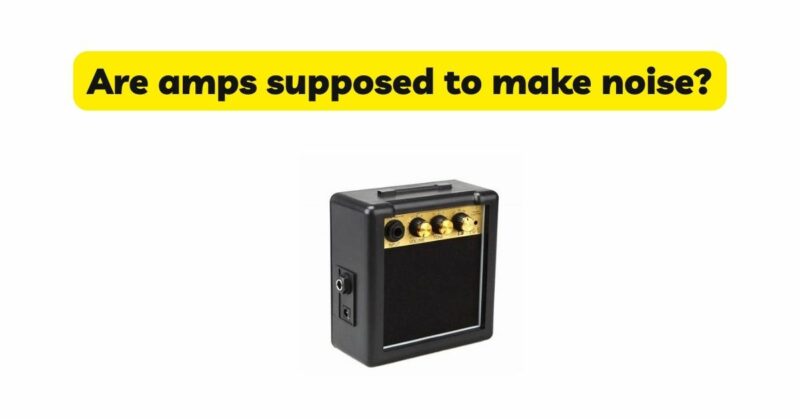Amplifiers are an essential component of audio systems, designed to amplify the sound produced by instruments or other audio sources. While amplifiers are primarily responsible for amplifying the desired signal, it is not uncommon for them to introduce some level of noise into the audio chain. In this article, we will explore the topic of amplifier noise, its causes, and how to manage and minimize it. By understanding the different types of amplifier noise and implementing effective strategies, you can ensure a clean and high-quality audio signal for your music or audio playback.
- Types of Amplifier Noise: a. Hiss: Hiss is a high-frequency noise that sounds like a faint hissing or static sound. It is often associated with amplifiers, especially those with high gain settings or solid-state circuitry. b. Hum: Hum is a low-frequency noise that typically manifests as a continuous, low-pitched hum or buzz. It can be caused by ground loops, improper grounding, or electromagnetic interference. c. Buzz: Buzz is a noise that is characterized by a continuous or intermittent buzzing sound. It can be caused by various factors such as faulty connections, damaged components, or electromagnetic interference. d. Rattle or Crackling: Rattle or crackling noises can occur when there is a loose connection, faulty cable, or damaged component within the amplifier.
- Causes of Amplifier Noise: a. Component Quality: Lower-quality components or older components in amplifiers may introduce additional noise into the signal path. b. Gain Stages: Higher gain settings in amplifiers can amplify background noise, resulting in a noticeable increase in overall noise levels. c. Improper Grounding: Poor grounding or ground loop issues can lead to unwanted noise, especially in audio systems with multiple interconnected devices. d. Interference: Amplifiers can pick up electromagnetic interference from nearby electrical devices, power cables, or improper signal routing. e. Environmental Factors: Environmental factors such as power fluctuations, electrical noise, or poor electrical wiring can contribute to amplifier noise.
- Managing and Minimizing Amplifier Noise: a. Quality Components: Choose amplifiers with higher-quality components, including resistors, capacitors, and transistors, to minimize noise introduced by the amplifier itself. b. Gain and Volume Settings: Adjust the gain and volume settings appropriately to avoid amplifying background noise excessively. c. Grounding and Wiring: Ensure proper grounding and address ground loop issues by using balanced cables, ground lifters, or isolators. d. Cable Management: Proper cable management and separation of power cables from audio cables can minimize electromagnetic interference. e. Power Conditioning: Use a power conditioner or surge protector to regulate the power supply and protect against power fluctuations or electrical noise. f. Noise Gates: Implement noise gates or noise reduction pedals in your signal chain to suppress unwanted noise during silent or quiet passages. g. Proper Maintenance: Regularly clean and inspect your amplifier for loose connections, damaged components, or dust buildup that can contribute to noise issues. h. Environment: Minimize environmental noise by ensuring a quiet and well-ventilated space for your amplifier setup.
- Seeking Professional Help: a. If the noise issue persists or if you are unsure about troubleshooting the problem yourself, consult a professional technician or audio engineer who can diagnose and address specific noise-related problems in your amplifier.
Conclusion: While amplifiers are not supposed to generate noise, it is not uncommon for them to introduce some level of noise into the audio signal. Understanding the different types of amplifier noise and their causes is crucial in effectively managing and minimizing unwanted noise. By selecting high-quality components, adjusting gain and volume settings appropriately, addressing grounding and wiring issues, practicing proper cable management, using power conditioning, implementing noise gates, and seeking professional help when needed, you can ensure a clean and high-quality audio signal from your amplifier. With careful attention to these strategies, you can enjoy your music or audio playback without the distraction of unwanted noise, allowing the true essence of your sound to shine through.


